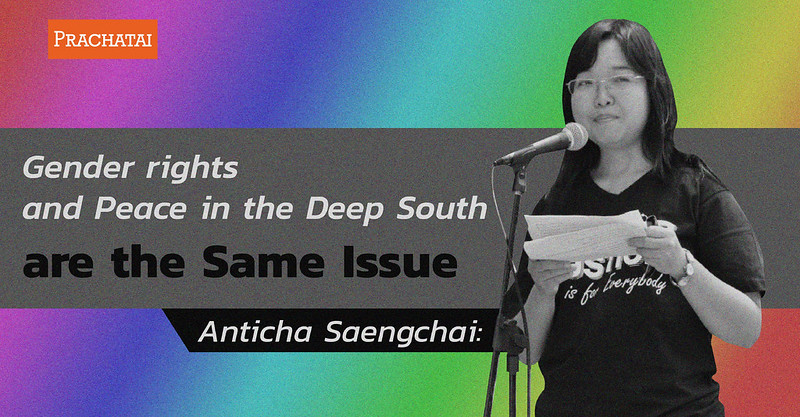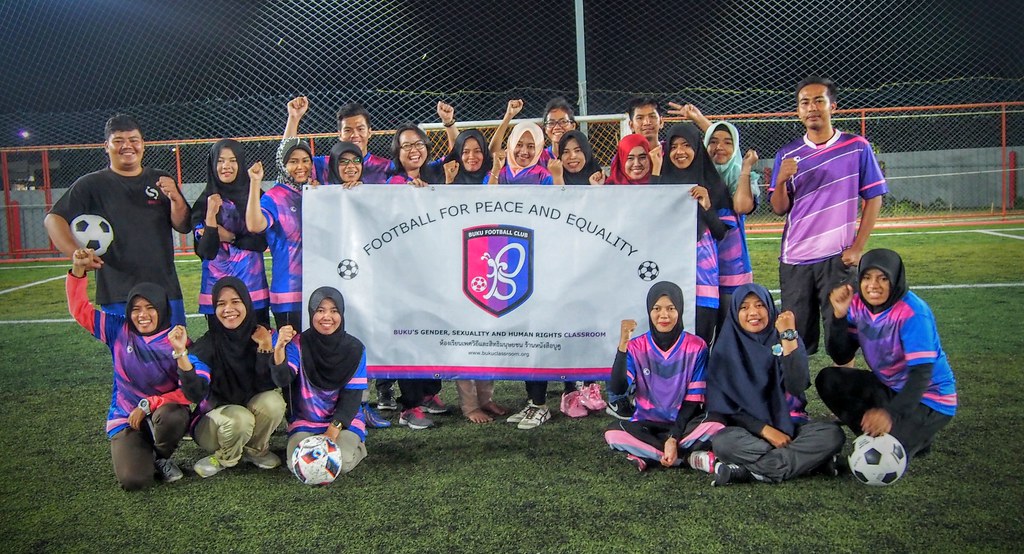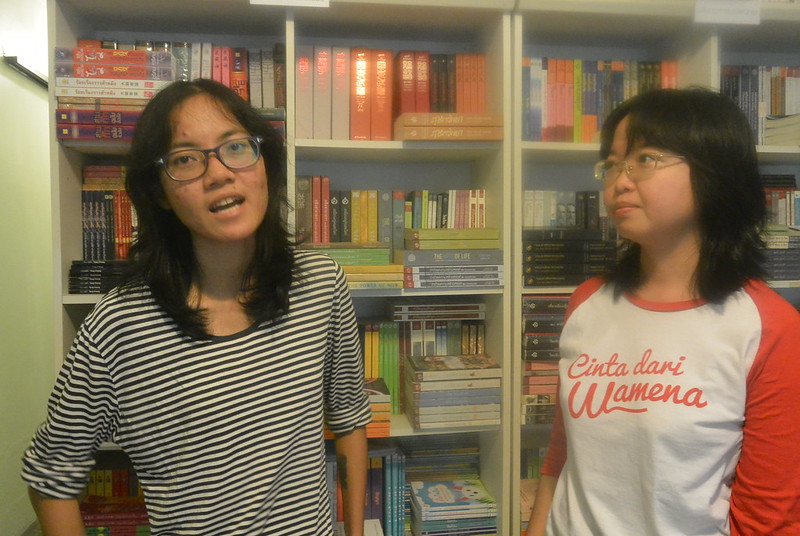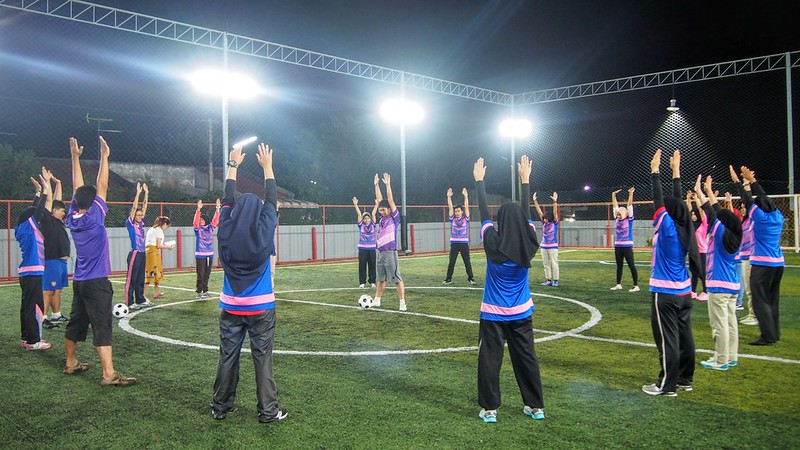Life in the Deep South is not easy for LGBT people. The politically volatile area, which has a Malay muslim majority, has been the site of discrimination and homophobia. People like Anticha, who are a non-believer and atheist, are already seen as “outsiders” in the Deep South because of their lack of faith. This difference only is increased by Anticha’s sexual orientation. A patriarchal and literary interpretation of Islam has been enforced throughout the region. In response, Anticha established a football team open to players of all gender identities. The football team recently became embroiled in controversy after Thailand PBS released a documentary. The responses to the documentary reveal the extent of the problem of anti-LGBT discrimination in the Deep South. She was called ‘satan’ on social media and accused of trying to use Western customs to brainwash the Muslim community.

Today, Anticha teaches philosophy at the Pattani campus of the Prince of Songkla University, and a gender rights activist. She and Daranee Thongsri, her girlfriend, own Buku Books & More Bookstore, and organized Football Buku FC, a soccer team of men and women of various gender identities, to educate participants about gender equality.
Buku FC received an award for championing the rights of women from the Human Rights Commission this past International Women’s Day on March 8.
Prachatai interviewed Anticha Saengchai of her coming out experience eight years ago. Society may not understand, but no gender identity is wrong, said the gender activist. She discussed her fight for equal gender rights in the Deep South and updated us with her future goals for Buku FC entering more tournaments.
Can you talk about your experience of coming out?
I thought about it a lot, because of I was in a complicated situation. I was married, with a daughter. If I was single, it would probably have been easier to decide how to live according to my sexual orientation. But it was hard to define myself to others. The most complicated thing for me was the fact that I was a mother.
I found that the source of my distress was the gender values I had been taught all my life, and how society misunderstood me. In the end, however, it became clear to me there was nothing wrong with my gender, and that society judges people in narrow definitions. Therefore, I had no reason to feel bad about myself. Whenever society has a problem with me I think, “what’s wrong with me?” I have to come out and take a stand for who I am and how I choose to live.
My family, especially my mother, couldn’t accept it when I moved to Pattani. I’m the youngest child in the house and the only one who was gay. My mum was unfamiliar with these issues and it affected her the most. She was probably afraid and worried of what I would face. She defined happiness as one thing: having a husband and children and loving family. She couldn’t envision how I would have a good life with a girlfriend.
I solved this problem over many years, showing my mother that, although I have a girlfriend, I was very happy with the life I chose, where I can be true to myself and my identity. It made me happy deep inside, without needing the approval of others.
After she saw that my life wasn’t how she imagined or how others told her it would be, she slowly accepted it and understood it intuitively. She can’t put her feelings into words, but she knows inside that I’m not doing anything wrong, that I’m living an ok, even a great, life. My sexual orientation is not a problem for my relationship with her.
In the past seven to eight years, society changed really quickly: social media has created a space for people of diverse gender identity to assemble and communicate. We were able to express our gender identities more through social media; I even met my girlfriend on Facebook.
Now, kids are growing up with social media, allowing them to have a wider view of gender identities so that it becomes a normal to them, unlike my generation.
Daranee Tongsiri and Anticha Saengchai
Did you worry that your daughter would understand?
Now not at all, but I was very worried eight years ago. When my kid was around two years old, I thought, “what will my child have to deal with as she grows up? Will she have issues with her mother having a girlfriend?” But now I feel relieved that there’s a wealth of information for her. And the best source of information is not from the Internet, but from me. I can tell her about who I am, that I’m a normal person, and that my love for her doesn’t change or lessen no matter what my sexual orientation is. She’s growing up in a rapidly changing society, so she will see gender diversity everywhere, too.
How is fighting for gender equality important?
Our gender is a fundamental part of our identity, and it defines our humanity in every aspect of our lives, from birth to death. We are taught to how to act, how to feel, our self worth according to our gender we are. Problems begin to arise if we defy the mainstream values, social mores and rules. We are discriminated against, violated, erased, treated unjustly, given limited opportunities, and more due to gender and sex issues. Women, men and gender-diverse groups are all affected by gender issues.
Men and women struggle in different ways. For example, after a violent event happens here in the south, sometimes the wife dies but the husband lives. He can easily remarry and find someone to take care of his kids. But if the wife lives while the husband dies, it’s different. She can remarry but social conditions will relegate her to lower social value than a man in the same position. Widows often do not marry single men, but marry a man who already has a wife, giving her an unequal status. A widow who does not choose to remarry is also looked down upon because society doesn’t believe she can take care of herself financially. She may be forced to remarry even if she is satisfied with what she has.
Gender issues are intimately connected with resources, violence and peace. Women’s movements here are sparked because of the violence that directly and indirectly affects women. One group of women here work in the civil society sector, focusing on issues like the environment, health, and career. When something violent happens, they work on that too. People who used to be victims are now helping others in the same situation. Those who used to seek compensation are now helping others get the same payment. Those who used to be sued for security lawsuits are now offering legal advice.
So in the Deep South, fighting for gender equality goes hand-in-hand with peace and stability issues?
Yes. Actually, there’s a large network of Deep South women that focuses on this issue. A coalition of 23 organizations and groups directly lobby for policy changes, such as those concerning safe public areas. They’re still working and gaining more and more traction.
Buku FC team-mates warm-up before playing football. Photo by Fadila Hamidong
Are people talking more about gender equality in the Deep South?
I think that it’s actions which are increasing, rather than talk. Women getting involved in peace issues didn’t start with gender issues, but they saw problems in other areas such the environmental or security. They arrive at gender issues later. But at the same time, there are other women who begin their movements right at gender issues, which may be due to their community values.
Does the state and the separatist movement regard women’s and LGBT rights in the Deep South with any importance?
Not at all. Neither party speaks on this issue. Civil society networks may have spoken about it five to six years ago when women’s movements were just starting out. But now, women have no role in official space or even in policy: there’s no women involved in the peace process discussion. However, women are involved in civil society movements that call for an end to violence and demanding justice. Women are often found in healing roles, which I see as tied to peace whether directly or indirectly.
Does your status as an outsider provide obstacles for your fight for gender equality in the Deep South?
It’s easy to be branded as an outsider: your ideas are viewed as outsider ideas, and people think you can’t understand the social complexities of the area. So yes, some things are obstacles where people judge me. But on the other hand, since I’m an outsider, I have space to do my own work and people don’t bother with me too much or assume that they can control me.
Depending on the issue, I can work with people in the area. For example, gender equality and giving women more rights and space isn’t something people attack me for because they can understand it. On more delicate issues, however, some people think I’m leading them astray, against customs and religion. So I have to communicate carefully, holding smaller or more closed gatherings of more like-minded individuals.
On many issues such as reproductive health rights, domestic violence, sexual harassment, and abortion, I can’t just work on them straightforwardly out in the open. For example, we held a closed group of elderly women where we had a safe space to talk about sexual pleasure. They asked questions that they didn’t know who to ask, such as if masturbation is wrong.

What are Football Buku FC’s next plans?
Right now we’re strengthening the team and planning to pass on the baton to the team members. I’m just the founder, but the newer generation should be the one to determine what direction the team goes.
I want the team to be good enough to enter official tournaments, such as in the 14 Southern Provinces tournament. I also want the team to have more coaches and trainers. Since the team was founded on the idea that soccer can be a place where we can learn about gender, the new trainers should have viewpoints or “gender lens” about gender equality.
Pattani is a pretty special province. Soccer is so popular that there will probably be a women’s league here soon. When they do, we want to play with them. Actually, there have been women’s football in Pattani for a long time, but it went unpublicised. The women’s province team even played in the 14 Southern Provinces tournament and finished second, but no one talked about them because they weren’t accepted by society. I hope Buku FC changes this, and makes women’s football more visible and diverse.
How many members are in Buku FC right now?
We have 23 members right now of all genders. Half are women and there are five men, as well as more gender-diverse people. We enter tournaments as women, so it’s up to the other team what they want us to do about the men. The men may play with them, or just play as goalies, or sit out the entire match. But when we practice, we all practice together.
I think it’s valuable to have a group of men grow up thinking that women playing soccer is a normal thing. Women and men on the field agree to several rules such as not using violence and not using men’s bodies to overpower others. These boys learn about these dimensions and when they grow up to be men, they will be the ones that understand gender equality well.
Read related stories:




